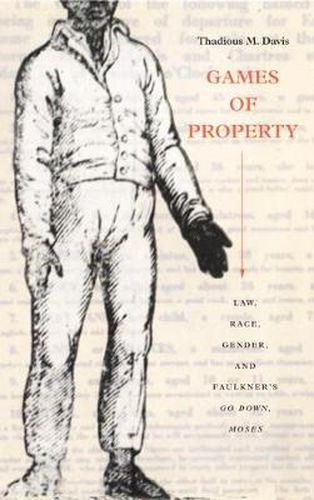Readings Newsletter
Become a Readings Member to make your shopping experience even easier.
Sign in or sign up for free!
You’re not far away from qualifying for FREE standard shipping within Australia
You’ve qualified for FREE standard shipping within Australia
The cart is loading…






In Games of Property , distinguished critic Thadious M. Davis provides a set of readings of William Faulkner’s Go Down, Moses - sometimes characterized as a novel, sometimes as a collection of stories - that offers a deep understanding of the interrelationship between the treatment of persons as property and the perception of laws, social forms, and rituals as games. She argues that the book, published in 1942, ranks among Faulkner’s finest and most accomplished works. Linking it to Dred Scott and a host of other legal cases, she shows how the law permeates Go Down, Moses , and, in so doing, she simultaneously enriches interpretations of Faulkner’s fiction and understandings of the power and scope of property law. The stories in Go Down, Moses span from the 1830s into the 1940s - the period during which enslaved persons went from being defined as property to being freed persons and citizens under the 13th, 14th, and 15th Amendments to the US Constitution. Games of Property reveals how the tensions inherent in ideas of persons as property that polluted the pre-Civil War republic persisted into Reconstruction and beyond, into Faulkner’s lifetime and the present day. Davis brings together law, social history, game theory, feminist critiques, and biographical information about Faulkner’s life in an interpretation of one of the famous writer’s most enigmatic works. Pointing out that Go Down, Moses is unified by games - fox hunting, gambling with cards and dice, racing - and that games, like the law, are rule-dependent forms of social control and commentary, she illuminates a dual focus within the book: on property and ownership on the one hand and on masculinist sport and social ritual on the other.
$9.00 standard shipping within Australia
FREE standard shipping within Australia for orders over $100.00
Express & International shipping calculated at checkout
Stock availability can be subject to change without notice. We recommend calling the shop or contacting our online team to check availability of low stock items. Please see our Shopping Online page for more details.
In Games of Property , distinguished critic Thadious M. Davis provides a set of readings of William Faulkner’s Go Down, Moses - sometimes characterized as a novel, sometimes as a collection of stories - that offers a deep understanding of the interrelationship between the treatment of persons as property and the perception of laws, social forms, and rituals as games. She argues that the book, published in 1942, ranks among Faulkner’s finest and most accomplished works. Linking it to Dred Scott and a host of other legal cases, she shows how the law permeates Go Down, Moses , and, in so doing, she simultaneously enriches interpretations of Faulkner’s fiction and understandings of the power and scope of property law. The stories in Go Down, Moses span from the 1830s into the 1940s - the period during which enslaved persons went from being defined as property to being freed persons and citizens under the 13th, 14th, and 15th Amendments to the US Constitution. Games of Property reveals how the tensions inherent in ideas of persons as property that polluted the pre-Civil War republic persisted into Reconstruction and beyond, into Faulkner’s lifetime and the present day. Davis brings together law, social history, game theory, feminist critiques, and biographical information about Faulkner’s life in an interpretation of one of the famous writer’s most enigmatic works. Pointing out that Go Down, Moses is unified by games - fox hunting, gambling with cards and dice, racing - and that games, like the law, are rule-dependent forms of social control and commentary, she illuminates a dual focus within the book: on property and ownership on the one hand and on masculinist sport and social ritual on the other.